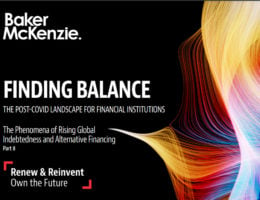The Ministry of Justice and the Ministry of Internal Affairs and Communications have recently approached certain foreign companies (in particular tech companies) and issued notices requiring that the company make a registration in Japan under the Companies Act.
In this article, we comment on this issue and provide our perspectives on the Japanese Companies Act, tax and other related laws and regulations such as the Telecommunications Business Act.
This paper seeks to promote a better understanding of the key considerations for establishing cross-border linkages between two or more national fast payment systems, thereby paving the way for national authorities to pursue more of these linkages in the future.
The business models of financial institutions are changing: how services are delivered, the ways in which they can earn revenue and the search for new ways to monetize value. COVID-19 has accelerated the take-up of digital transformation due to the need to conduct more business remotely through digital channels. Simultaneously, customers have shown a greater willingness to use technologies in which previously they may have lacked confidence.
Read our ninth installment focused on the impact of new technology on financial institutions.
The risks arising from unsustainable indebtedness to which both traditional and alternative financing sectors have exposure are higher in emerging economies, where the debt burden is much more elevated generally and whose borrowers are more susceptible to default if (as is expected), US dollar interest rates rise. Emerging economies with less policy intervention, monitoring and regulation are more vulnerable than advanced economies. This eighth installment focuses on the phenomena of rising global indebtedness and alternative financing.
For a little over a year now, the financial sector has been occupied with the need for resilience in the face of the challenges posed by the pandemic, but we are now swiftly and surely moving into the reform and renewal stages of recovery. It’s now time to reflect on what is changing as well as the lessons we have learnt so that the financial sector can continue to best serve and support its clients and markets.
COVID-19 represents one of the greatest ever shocks to our economies and, in consequence, to the business models of financial institutions and the way they do business. While many changes to business processes and operations were already taking place prior to the pandemic, COVID-19 has given many added impetus and urgency. Decision-makers must choose between adapting a wait-and-see approach or implementing more proactive strategies to safeguard and, if possible, grow their businesses.
COVID-19 represents one of the greatest ever shocks to our economies and, in consequence, to the business models of financial institutions and the way they do business. While many changes to business processes and operations were already taking place prior to the pandemic, COVID-19 has given many added impetus and urgency. Decision-makers must choose between adapting a wait-and-see approach or implementing more proactive strategies to safeguard and, if possible, grow their businesses.
A COVID-19 represents one of the greatest ever shocks to our economies and, in consequence, to the business models of financial institutions and the way they do business. Decision-makers must choose between adapting a wait-and-see approach or implementing more proactive strategies to safeguard and, if possible, grow their businesses.
COVID-19 represents one of the greatest ever shocks to our economies and, in consequence, to the business models of financial institutions and the way they do business. While many changes to business processes and operations were already taking place prior to the pandemic, COVID-19 has given many added impetus and…
COVID-19 represents one of the greatest ever shocks to our economies and, in consequence, to the business models of financial institutions and the way they do business. While many changes to business processes and operations were already taking place prior to the pandemic, COVID-19 has given many added impetus and…









